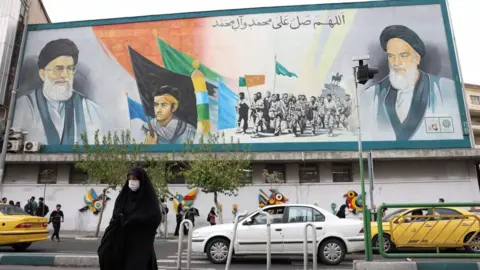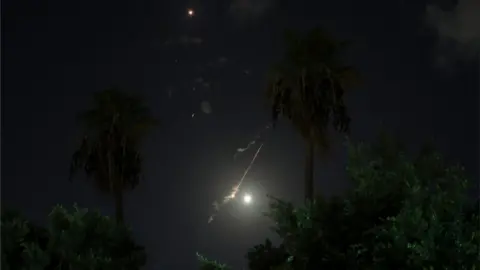[ad_1]
 EPA
EPAIsrael’s attack on Iran deepens the war in the Middle East. Avoiding, or risking, an even worse escalation is at the heart of decisions being taken by Iran’s supreme leader, Ayatollah Ali Khamenei and his key advisors.
They must decide on the least bad of a series of difficult choices. At one end of the spectrum is hitting back with another wave of ballistic missiles. Israel has already threatened to retaliate again if that happens.
At the other is deciding to draw a line under the destructive exchanges of direct strikes on their respective territories. The risk for Iran if it holds its fire is that looks weak, intimidated and deterred by Israel’s military power and political determination, backed up by the United States.
In the end, the supreme leader and his advisers are likely to take the decision that, in their view, does least harm to the survival of Iran’s Islamic regime.
Empty threats?
Iran’s official media in the hours before and after Israel’s attacks carried defiant statements that, at face value, suggest the decision to respond had already been taken. Its language resembles Israel’s, citing its right to defend itself against attack. But the stakes are so high that Iran might decide to walk its threats back.
That is the hope of Britain’s Prime Minister Sir Keir Starmer, who fell in behind America’s insistence that Israel has acted in self-defence.
“I am clear that Israel has the right to defend itself against Iranian aggression,” he said. “I’m equally clear that we need to avoid further regional escalation and urge all sides to show restraint. Iran should not respond.”
Iran’s own statements have been consistent since its ballistic missile on Israel on 1 October. A week ago, Iran’s Foreign Minister Abbas Araghchi told Turkey’s NTV network that “any attack on Iran will be considered crossing a red line for us. Such an attack will not go unanswered.”
Hours before the Israeli strikes, the Iranian Foreign Ministry spokesperson Esmail Baqai said: “Any aggression by the Israeli regime against Iran will be met with full force.” It was, he said, “highly misleading and baseless” to suggest that Iran would not respond to a limited Israeli attack.
As the Israeli aircraft were heading back to base Iran’s foreign ministry invoked its right to self defence “as enshrined in Article 51 of the UN Charter”. A statement said Iran believed it was both entitled and obligated to respond to foreign acts of aggression.
Deadly exchanges
Israel has set the pace of escalation since the spring. It sees Iran as the crucial backer of the Hamas attacks that killed about 1,200 people – Israelis and more than 70 foreign nationals – on 7 October last year. Fearing that Israel was looking for a chance to strike, Iran signalled repeatedly that it did not want a full-on war with Israel.
That did not mean it was prepared to stop its constant, often deadly, but lower-level pressure on Israel and its allies.
The men in Tehran thought they had a better idea than all-out war. Instead, Iran used the allies and proxies in its so-called “axis of resistance” to attack Israel. The Houthis in Yemen blocked and destroyed shipping in the Red Sea. Hezbollah rocket fire from Lebanon forced at least 60,000 Israelis from their homes.
Six months into the war, Israel’s retaliation forced perhaps twice as many Lebanese from their homes in the south, but Israel was prepared to do much more. It warned that if Hezbollah did not hold its fire into Israel and move back from the border it would take action.
When that did not happen, Israel decided to break out of a battlefield that had been shaped by Iran’s limited, but attritional war. It landed a series of powerful blows that threw the Islamic regime in Tehran off balance and left its strategy in tatters. That is why, after the latest Israeli strikes, Iranian leaders have only hard choices.
Israel interpreted Iran’s reluctance to fight an all-out war as weakness, and upped the pressure both on Iran and its axis. Prime Minister Benjamin Netanyahu and Israel’s commanders could afford to take risks. They had President Joe Biden’s unequivocal support, a safety net that came not just in the shape of massive deliveries of munitions, but with his decision to send significant American sea and air reinforcements to the Middle East to back up the US commitment to defend Israel.
On 1 April an Israeli airstrike destroyed part of Iran’s diplomatic compound in Damascus, the Syrian capital. It killed a top Iranian commander, Brig Gen Mohammed Reza Zahedi, along with other senior officers from the Iran’s Islamic Revolutionary Guard Corps (IRGC).
The Americans were furious that they had not been warned and given time to put their own forces on alert. But Joe Biden’s support did not waver as Israel faced the consequences of its actions. On 13 April Iran attacked with drones, cruise and ballistic missiles. Most were shot down by Israel’s defences, with considerable help from armed forces of the US, UK, France and Jordan.
Biden apparently asked Israel to “take the win” hoping that might stop what had become the most dangerous moment in the widening Middle East war. When Israel confined its response to a strike on an air defence site, Biden’s plan seemed to be working.
 Reuters
ReutersBut since the summer, Israel has repeatedly escalated the war with Iran and its axis of allies and proxies. The biggest blows were landed in a major offensive against Iran’s most important ally, Hezbollah in Lebanon. Iran had spent years building up Hezbollah’s arsenal of weapons as a key part of its forward defence. The idea was an Israeli attack on Iran would be deterred by the knowledge that Hezbollah would hammer Israel from just over the border in Lebanon.
But Israel moved first, implementing plans it had developed since Hezbollah fought it to a standstill in the 2006 war. It blew up booby trapped pagers and walkie talkies it had deceived Hezbollah into buying, invaded south Lebanon and killed Hezbollah’s leader Sheikh Hasan Nasrallah, a man who had been a symbol of defiant resistance to Israel for decades. The authorities in Beirut say that Israel’s offensive in Lebanon has so far killed more than 2,500 people, displaced more than 1.2 million and caused enormous damage to a country already on its knees after its economy largely collapsed.
Hezbollah is still fighting and killing Israeli soldiers inside Lebanon and firing large numbers of rockets. But it is reeling after losing its leader and much of its arsenal.
Faced with the near collapse of its strategy, Iran concluded it had to hit back. Allowing its allies to fight and die without responding would destroy its position as the leader of the anti-Israeli and anti-western forces in the region. Its answer was a much bigger ballistic missile attack on Israel on 1 October.
The airstrikes on Friday 25 October were Israel’s response. They took longer to come than many expected. Leaks of Israeli plans could have been a factor.
Israel is also carrying out a major offensive in northern Gaza. The UN human rights chief Volker Turk has called it the darkest moment of Gaza’s war, with the Israeli military subjecting an entire population to bombing, siege and the risk of starvation.
It’s impossible for an outsider to know whether the timing of Israel’s attacks on Iran was designed to draw international attention away from northern Gaza. But it might have been part of the calculation.
 EPA
EPAStopping a spiral of escalation
It is hard to stop successive rounds of strikes and counter strikes when the countries concerned believe they will be seen as weak, and deterred, if they don’t respond. That is how wars spin out of control.
The question now is whether Iran is prepared to give Israel the last word, at least on this stage of the war. President Biden backed Israel’s decision to retaliate after 1 October. But once again he tried to head off an even deadlier escalation, telling Israel publicly not to bomb Iran’s most important assets, its nuclear, oil and gas installations. He augmented Israel’s defences by deploying the THAAD anti-missile system to Israel, and prime minister Netanyahu agreed to take his advice.
The American elections on 5 November are part of both Israel and Iran’s calculations about what happens next. If Donald Trump gets his second term, he might be less concerned than Biden about answering Iranian retaliation, if it happens, with strikes on nuclear, oil and gas facilities.
Once again, the Middle East is waiting. Israel’s decision not to hit Iran’s most valuable assets might, perhaps, give Tehran the chance to postpone a response, at least long enough for diplomats to do their work. At the UN General Assembly last month, the Iranians were suggesting that they were open to a new round of nuclear negotiations.
All this should matter greatly to the world outside the Middle East. Iran has always denied it wants a nuclear bomb. But its nuclear expertise and enrichment of uranium have put a weapon within its reach. Its leaders must be looking for a new way to deter their enemies. Developing a nuclear warhead for their ballistic missiles might be on their agenda.
[ad_2]
Source link




